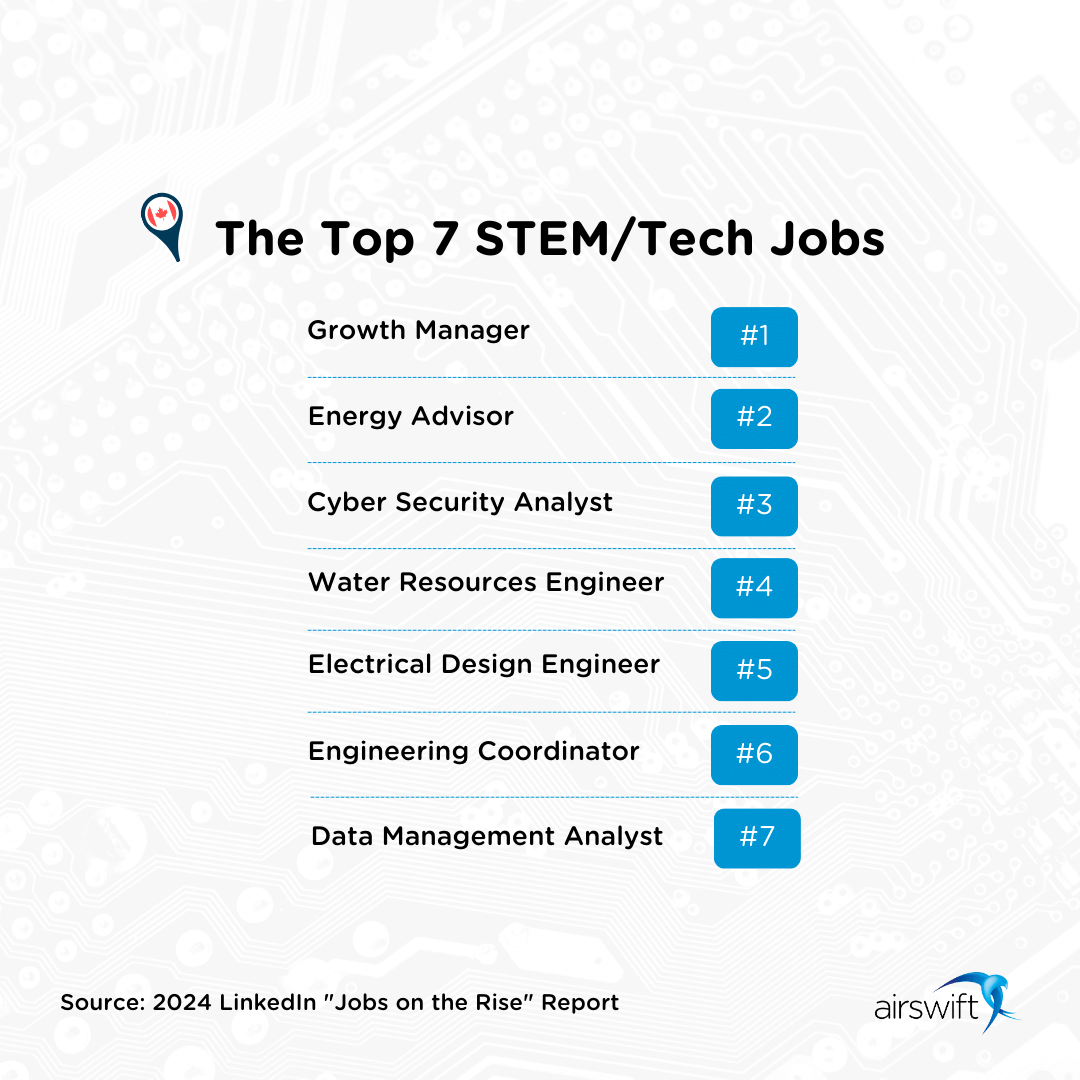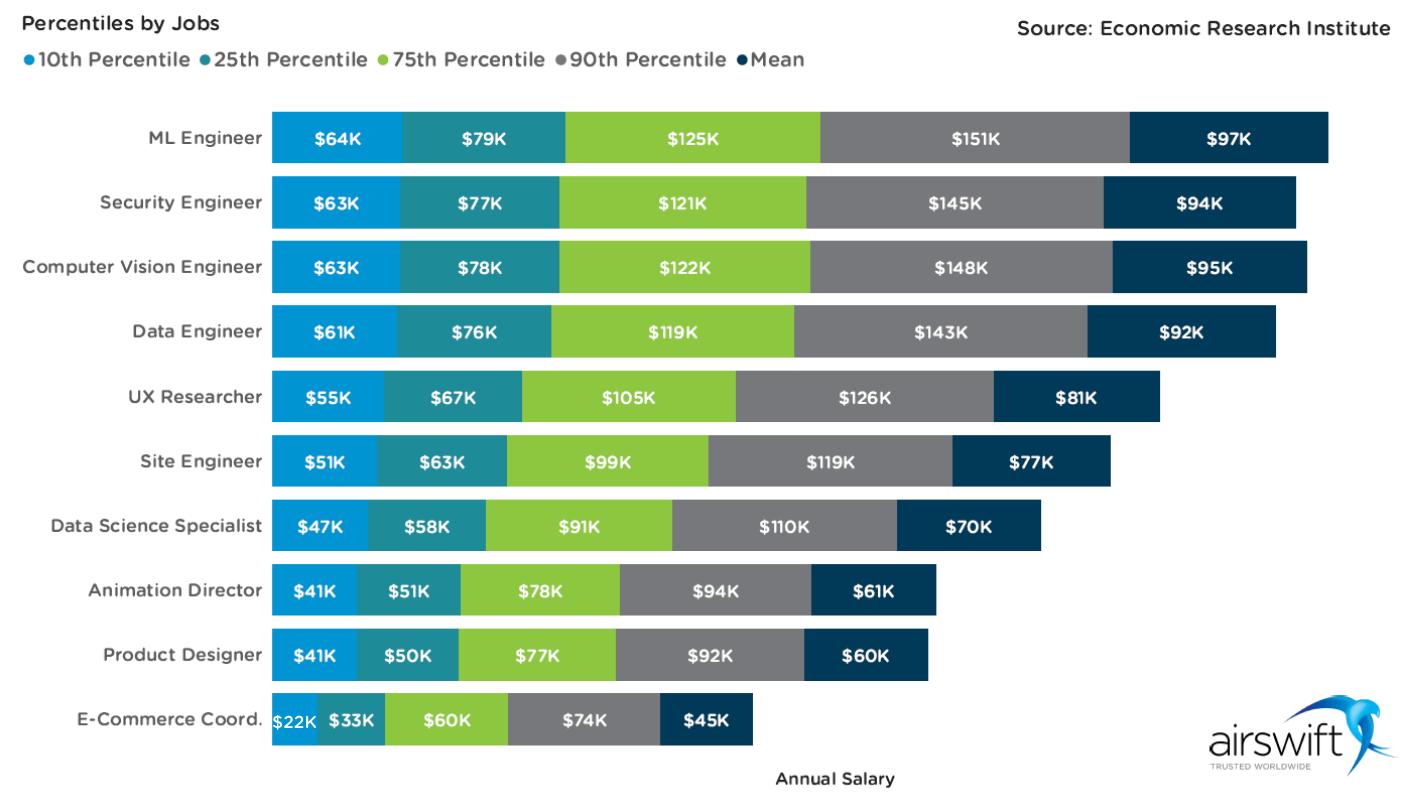
By
Raphael Santos
May 8, 2024
Updated
June 27, 2024
Source: Frame Stock Footage/Shutterstock
LinkedIn''s 2024 report on the fastest-growing roles, "Jobs on the Rise," has been released, and to no one's surprise, tech and energy jobs have secured top positions in the ranking!
Drawing data from LinkedIn, this report identifies 10 jobs in Canada that have seen the most substantial growth over the past five years.
As expected, the top position on the list is dominated by the "Growth Manager" role. In a nation that is becoming more interconnected and is currently a hub for advanced technology, it is no surprise that Canada is seeking avenues to expand business solutions and reach wider audiences.
Table of Contents
The 10 most in-demand jobs in Canada are the fastest-growing ones
LinkedIn is assertive in pointing out that the fastest-growing jobs in the past five years are an excellent way to predict the medium and long-term employment market. See the graph below featuring Canada's 10 most in-demand roles according to its growth rate.

In short, the placement of the Growth Manager role at the forefront of the infographic underscores the importance of strategic, data-driven decision-making in fostering significant growth within the tech sector.
This trend indicates that companies increasingly value people who can analyse and interpret data to make informed decisions, a skill of utmost importance in today’s tech world.
Roles such as Energy Advisor and Cyber Security Analyst also signal a strong demand in sectors focused on sustainable energy and tech-driven security solutions.
Also, the emphasis on diverse and strategic roles such as Diversity and Inclusion Specialist and Strategy Associate indicates a shift towards more socially responsible and strategically adaptive business practices.
What makes Growth Manager stand out as the top choice?
This position signals a robust growth trajectory within the technology sector for several reasons:
- Adaptation to market changes: Growth Managers are skilled at identifying and adapting to market trends. Their ability to forecast market needs and align business strategies accordingly is particularly valuable in the fast-paced tech industry, where consumer preferences and technological capabilities evolve rapidly.
- Implementation of scalable strategies: They develop and implement scalable growth strategies, ensuring the company can expand its operations and customer base without proportionally increasing costs.
- Cross-functional collaboration: Growth Managers often work across various departments within a tech company, including marketing, product development, and sales, to ensure cohesive growth efforts. This integration allows for a more agile response to developing new technologies and market opportunities.
- Focus on metrics and data-driven decisions: Utilising analytics to drive decisions, Growth Managers in tech settings use extensive data to optimise processes and improve performance. Real-time data often supports Their strategic decisions, enhancing the company's ability to pivot and adapt strategies efficiently.
- Enhancing customer acquisition and retention: They play a key role in acquiring new customers and retaining them through innovative loyalty programs and continuous engagement strategies.
The seven most needed tech jobs in Canada
In this section, we further identify seven of the most in-demand STEM/tech-adjacent jobs from LinkedIn's report.

Canada's job market is known for presenting technological challenges, with a landscape anchored in cutting-edge solutions like blockchain, quantum computing, and fusion energy. Unsurprisingly, the country has garnered attention for seeking skilled talent.
But what are challenges without rewards? This naturally leads every tech worker to ask, "What is the salary like in the Canadian market?" This is a question we answer below.
How much do tech jobs pay in Canada?
The following visual representation showcases salary insights from the Economic Research Institute regarding various sought-after roles in Canada. All are denoted in US dollars for better clarity.

Tech Engineers and Software Developers still hold the top spots for high-paying positions in Canada's tech industry.
However, it's worth noting that certain roles are catching the eye of technology companies in the country. An intriguing example is the rise of Growth and Project Managers, often identified as E-Commerce Coordinators on the job market lists.
Machine Learning Engineer (Mean - $97,000)
Tech recruiters have highly pursued Machine Learning Engineers. The Canadian industry has a fertile technological environment for programmers to grow and have job stability in large companies or even growing startups. There, they will be required to develop their work through the most-used libraries such as:
- Scikit-Learn
- Keras
- MLlib
- PyTorch
- Azure
Security Engineer (Mean - $94,000)
The Security Engineer is a cybersecurity professional responsible for monitoring and anticipating attacks and failures in an organisation's network and systems. In Canada's tech industry, which is heavily populated by deep tech, this experience and know-how are essential.
The job of a Cybersecurity Specialist is often proactive. They need to anticipate the threats that can affect the company and fix that vulnerability.
Computer Vision Engineer (Mean - $95,000)
The work of Computer Vision Engineers involves image analysis in conjunction with A.I. implementation work. This professional will extract data and work with machine learning to teach the computer to interpret visuals.
This technology has been widely used in the healthcare (skin cancer detection), automotive (accident prevention) and manufacturing (safety of work) industries.
Data Scientists (Mean - $70,000)
Data Scientists are what we might call the "rockstars" of technology. Today, every company works with data analysis, and the person responsible for interpreting and predicting new scenarios with the help of algorithms is fundamental.
Top 10 certifications in-demand in Canada
Numerous training programs and certifications have disrupted the typical study regimen of tech professionals.
Here are the 10 most in-demand certifications across Canada according to Skillsoft's 2023 report.

The most sought-after roles in the tech industry are largely concentrated in cybersecurity, network/cloud architecture, and data management.
To secure a position among the highest earners, mastering these skills is crucial for success in the industry.
How is AI impacting Canada's tech jobs?
In Canada’s tech job market, AI is revolutionising the skillsets required across various roles. For instance:
Cyber Security Analyst
- AI use case: Implementing AI-driven intrusion detection systems that learn and adapt to new threats over time.
- Practical scenario: An analyst could use AI to monitor network traffic in real-time, quickly identifying and responding to unusual patterns that may indicate a security breach.
Growth Manager
- AI use case: Utilizing predictive analytics to forecast market trends and identify potential areas for business expansion.
- Practical scenario: A growth manager might leverage AI to analyze customer data, predict future buying behaviors, and tailor marketing strategies accordingly.
Sustainability Manager
- AI use case: Applying AI for energy consumption analysis to reduce the carbon footprint of operations.
- Practical scenario: A sustainability manager could use AI to optimize the energy usage of a manufacturing plant, significantly lowering costs and environmental impact.
Customer Experience Specialist
- AI use case: Deploying AI-powered chatbots to provide instant, 24/7 customer support and personalized shopping recommendations.
- Practical scenario: A specialist might implement an AI chatbot that handles customer inquiries, freeing up human agents to tackle more complex issues.
Highlight your skills with AI
Leverage AI in your resume to highlight your digital skills and stand out to employers.
Download our top 10 prompts for showcasing your expertise with tools like ChatGPT, preparing you for job opportunities in various tech roles.
The importance of soft skills for tech professionals in Canada
The hybrid skillset
Although technical skills are undeniably in high demand and often come with competitive salaries, it is important to note that professionals sought after by companies possess a diverse skill set beyond just technical abilities.
The report I, Human: Digital and Soft Skills in a New Economy published by the Brookfield Institute and Burning Glass Technologies analysed the Canadian labour market. The study researched over 7 million English-language online job postings in the country from 2012 to 2018 to know what in-demand skills were needed by employers.
The study found that technical roles not only required intensive digital skills but also necessitated soft skills like communication, organisation, writing, and presentation.
The jobs that require the highest portion of digitally intensive skills are also the most hybrid and the postings also looked for communications skills, budgeting, project management.
Viet Vu - Lead Researcher
In Canada's tech industry, where investments in deep tech are prevalent, in-demand jobs rely on innately human abilities to derive positive solutions from digital innovations.
Soft skills are also essential to dealing with ethical and cultural issues related to the implementation of these disruptive technologies.
According to the study, some of the skills that will be valuable include:
- Planning: The ability to plan your routine in an organized way to meet deadlines and also maintain quality delivery.
- Troubleshooting: It takes an analytical and innovative approach to solve complex problems and not fall into simple tasks.
- Project management: Organising multiple tasks and a high-performance team is a task for few. That's why you should learn this soft skill high-demanded by companies.
- Research: It all starts with good research. You will need to investigate and develop a research method that will help you advance in your daily tasks and in more long-term subjects.
- Quality Assurance and Control: We all have high expectations of data scientists. After all, these professionals will be heard when business decisions are on the table. So, a high level of quality in data interpretation is critical.
Alberta's case
Information and Communications Technology Council's new report, Settling for More: Matching Newcomers to Alberta’s Tech Sector, is another recent report to help understand the Canadian labour market better.
The study shows how employers have been basing their interviews more on soft skills than the candidates' hard skills.

Being able to work within a team, willing to help others, able; to communicate confidently, and have empathy for teammates and customers… these qualities don’t always come with technical people.
Roger Milley, Founder - CEO, Fuzeium Data Analytics
As detailed in the study, it is also very important to be clear about the difference between soft skills and cultural fit in the hiring process for employers and employees.
Airswift can help you get hired in Canada
With a substantial presence in Canada since 2007, Airswift proudly boasts five offices strategically located across the Great White North:
- Calgary, Alberta
- St John’s, Newfoundland and Labrador
- Halifax, Nova Scotia
- Toronto, Ontario
- London, Ontario
Our extensive history in the engineering and technology sectors has uniquely positioned us to connect top-tier and emerging companies with the finest global talent. Take the next step towards uncovering your next significant STEM career opportunity by checking out our latest tech jobs offerings below.


